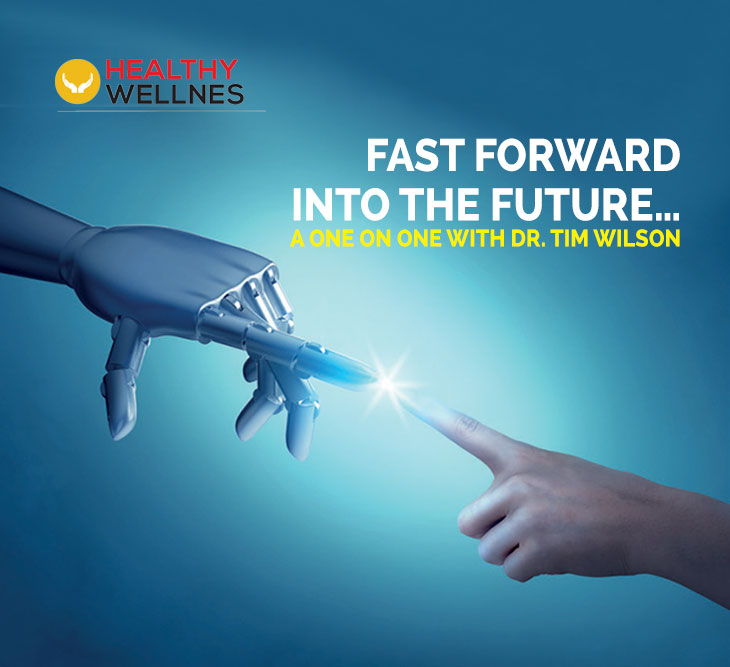
At the recent Thumbay Group’s innovative Artificial Intelligence (AI) Conference held on April 11 in Dubai, HEALTH had the opportunity to speak with Dr. Tim Wilson, ME Health Industries Leader at PwC about the future of Artificial Intelligence in the health sector.
Keeping a Check on AI
“It is up to us to determine how to control AI which is what the UAE has officially implemented already. So you need great leaders in place like His Highness Sheikh Mohammed Bin Rashid Al Maktoum, Vice President and Prime Minister of UAE first and foremost. Then His Excellency Omar bin Sultan Al Olama, Minister of State for Artificial Intelligence. Then we need regulators following through with this. So here in the UAE in particular, you see more activity and more thinking regarding AI than anywhere else really. It is outstanding and they are going to shape the future.”
AI in Our Pocket
“In the future, the role of AI is going to be more integrated. For instance, Soul Machines are something that people don’t even know are an avatar. It is so empathetic that it reacts to your facial expressions and tone of voice. We are already interacting with AI almost daily without even knowing it and it’s already in our pocket. If you are using WhatsApp, you are using AI already. In fact, Google is run by Deep Mind, another AI application. When you speak to your phone in an Android operating system, this is AI.”
Changing the Face of Health Care
“It is in the nature of human beings when seeking a specialist to look for the best in the field and for those with specific expertise. However, the problem is that despite their vast amounts of knowledge, he or she won’t know as much as AI. It is true that we teach AI, but in fact AI will know more because it is faster, more efficient, it can read the journals and start to look at patterns. AI can also crunch data it knows based on genotypes, lifestyle, family, history, past medical records, history with medications being taken; and it can compute based on this huge amount of data. This is something a human being just cannot do. The key is that we have to be training doctors to work alongside with AI in order to accept it.”
Plus Points of AI
“Successfully implementing AI in the healthcare system will have lots of benefits. AI is cheaper,provides high quality, and is easier to access to healthcare. Furthermore, diagnosis and treatment could become more accurate and the emphasis could move to primary prevention either by helping stop someone from getting a disease or by controlling complications. AI can also enhance the effectiveness of medicines in the long run.”
About Dr. Tim Wilson Health Industries Leader –Middle East
 Tim has over 22 years’ experience as ahigh quality practicing family doctor and he was recognized in 1995 when he became the youngest fellow (byassessment) of the Royal College of GPs. Tim has high level experience in health policy and strategy and has provided advice to governments on creating high value health systems. He has published widely on quality and safety in healthcare. Tim led the award winning NHS@75 campaign, recognized as the UK’s leading marketing campaign.
Tim has over 22 years’ experience as ahigh quality practicing family doctor and he was recognized in 1995 when he became the youngest fellow (byassessment) of the Royal College of GPs. Tim has high level experience in health policy and strategy and has provided advice to governments on creating high value health systems. He has published widely on quality and safety in healthcare. Tim led the award winning NHS@75 campaign, recognized as the UK’s leading marketing campaign.
Tim leads a team of clinical specialists to improve clinical quality and costefficiency. This work has included changing clinical practices and involving clinicians, especially senior doctors, in cost effectiveness decisions and pathway redesign. His areas of specialization include quality, safety, patient experience, and clinical excellence.
He has led over 25 successful large scale system change projects to build sustainable health and social care economies and has set up and run national quality improvement and quality assurance programs.
Tim has led PwC’s support on the review of high mortality hospitals and later establishing the new quality inspection program.
He also worked with commissioners and policy makers in establishing novel contracting and payment mechanisms to drive up value and improve outcomes.


